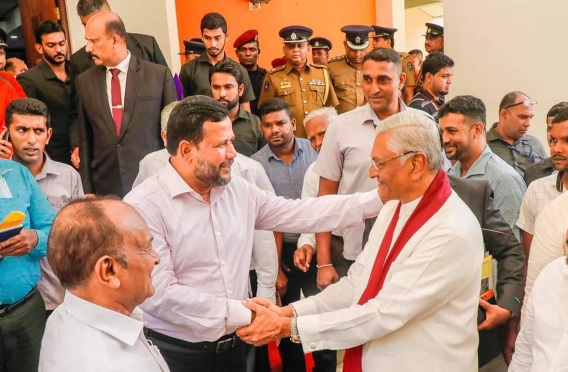By P. K. Balachandran
Colombo, October 4: Sri Lankan President Gotabaya Rajapaksa has categorically denied his government has entered into a deal with the All Ceylon Makkal Congress (ACMC) leader and former commerce minister Rishad Bathiudeen.
In a Facebook special message posted on Sunday (4), the President said: “Ensuring national security is the first and foremost responsibility of my government. I am not prepared to hand over the power of arresting or arbitrarily releasing people to politicians, as happened in the past. I will also take actions to rectify any omissions or mistakes made by the relevant authorities or officials. I emphasize that our government has not entered into any political deal with parliamentarian Rishad Bathiudeen. I assure my citizens that I will not forsake the trust that they have placed in me and I will most certainly continue to work towards strengthening the built trust.”
This puts to rest speculation and assessments that the Rajapaksas have entered into a deal with Bathiudeen to get enough votes for the controversial 20th Constitutional Amendment (20A) when it is taken up in Parliament after getting the determination of the Supreme Court on its constitutionality.
Presently, the government has 149 MPs excluding the Speaker. But it would require a minimum of 150 to get the required two-thirds majority to pass the 20A. To be on the safe side, it needs at least four more MPs, in case there are rebels and abstentions in view of the fact that within the ruling Sri Lanka Podujana Peramuna (SLPP) itself there are reservations about many of its clauses.
Media reports talk of 28 amendments being moved at the committee stage in Parliament.
When the Gotabaya Rajapaksa government was installed in November 2019, it eschewed the standard practice of accommodating Muslim parties in the Council of Ministers and other para-state organizations. That radical departure from established practice was based on the widespread allegation that the Muslim parties had callously supported, tolerated or turned a blind eye to, the activities of the Islamic zealots who blasted churches and hotels killing more than 250 people on Easter Sunday, April 21, 2019.
But subsequently, a change of heart and a change in the political assessment was said to have taken place due to the need to get two-thirds majority for 20A in the context of growing opposition, within the SLPP itself, to some of the provisions relating to the power of Parliament vis-à-vis the President.
The SLPP’s managers were thus fishing for a minimum of four and a maximum 20 to make up for any defections.
It was reported that the ACMC, led by Bathiudeen, had indicated its willingness to join the government and that the government was likely to offer some of the ACMC’s four MPs governmental positions if not places in the Council of Ministers. The rumour persisted despite Bathiudeem telling the media that he would not join the government.
As regards the Sri Lanka Muslim Congress (SLMC) led by Rauff Hakeem, sources said the SLPP had not received any request to be accommodated. “This is probably because of the nature of the SLMC’s voters, who are the Muslims of South Sri Lanka. These Muslims are still quite alienated from the Rajapaksas for their “anti-Muslim” stance and the 2014 Aluthgama riots. In contrast, the Muslims of the North and the East are not so acutely anti-Rajapaksa,” the source said.
“The North East is a different kettle of fish. Here, even the Tamils are gradually becoming pro-government. One could see this from the way pro-government candidates performed in the recent parliamentary elections. Pro-government Tamils Angajan Ramanathan, Douglas Devananda, Pillayan and Vyalendran won with substantial votes. Athaullah, a Muslim, won from the East. Bathiudeen‘s constituency is among the Muslims of Puttalam (who are refugees from the North), Mannar and Ampara (both in North-East),” the source pointed out.
Indication of a change in the relations between the government and Bathiudeen began to appear as his brother Riyaj was released from prison, though he was arrested for possible involvement in the Easter Sunday blasts. The charges were pretty serious. But later the Police Spokesman Jaliya Senaratne said investigations revealed there was no case for his arrest. Following the release, the media flashed a photo in which Cabinet Minister for Home and State Minister of Defense, Chamal Rajapaksa, was warmly greeting Rishad Bathiudeen at a public event.
Put off by this, but refraining from speculating on any extra-legal reasons for releasing Riyaj Bathiudeen, the head of the Catholic Church in Sri Lanka, Cardinal Malcolm Ranjith sought a review of the decision for the “sake of fairness and justice” as so many people, mostly Catholics, were killed in the April 21 blasts. Riyaz was earlier accused of having had close personal and financial relations with one of the suicide bombers.
But with the President coming out with a statement on Sunday saying that he is standing by his declared policy as regards Bathiudeen and national security, all speculation about a deal with ACMC and SLMC has been laid to rest.
By his denial, the President has assured the Sinhala-Buddhist nationalists that there will be no truck with those tainted with the terror strikers of Easter Sunday, suspected or otherwise. This will at least keep the Sinhala-Buddhist MPs within the fold at the time of voting on the 20A.
However, the need for defectors from the opposition will still be there. But these will be sought from the politically safe, Sinhala-majority parties like the Samagi Jana Balawegaya (SJB) led by Sajith Premadasa, and from the parties of the Indian origin Tamils, which are now with the SJB.
(The featured image above shows Rishad Bathiudeen with Chamal Rajapaksa, Minister of Home and State Minister of Defense)































































